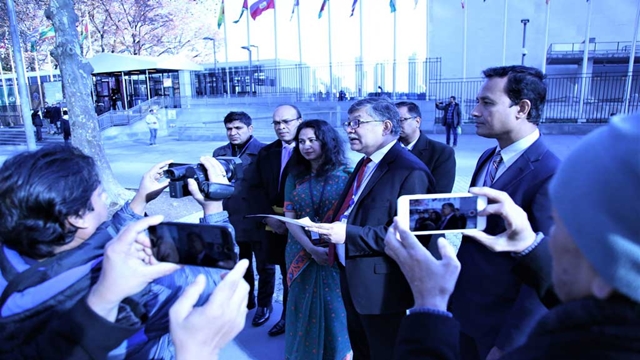FT Online Desk
Published:2019-11-23 22:32:44 BdST
UN adopts Dhaka’s resolution on natural fibres
The United Nations (UN) has adopted by consensus Bangladesh’s resolution on natural fibres, paving the way for a stronger, effective, and efficient "global value chain" for jute and other natural fibre products. The resolution, titled “Natural Plant Fibres and Sustainable Development”, was adopted at the plenary session of the Second Committee of the 74th session of the UNGA. It was tabled in the committee in September.
The resolution primarily focuses on jute and other natural fibres, such as abaca, coir, kenaf, sisal, hemp, and ramie, which are lesser known to the international community. It iterates that the promotion of these fibres will contribute to the achievement of Sustainable Development Goals.
Bangladesh took the lead in highlighting the potential economic, social, and environmental benefits of the natural plant fibres like jute, which is known as the "golden fibre" in Bangladesh, the Permanent Representative of Bangladesh to the UN, Ambassador Masud Bin Momen, said on Thursday.
This is in accordance with a press release released yesterday (Friday).
“This resolution will pave the way for a stronger, effective, and efficient ‘global
value chain’ for jute and other natural fibre products. If the demand for jute and jute products increase in the global market, Bangladesh’s jute growers and traders will get competitive prices,” he said. The resolution will pave the way for fostering scientific research, development and cooperation at national, regional and global levels to ensure, in addition to its traditional use, high-end, value-added and innovative use of all lesser known natural plant fibres, he hoped.
“Our objective is primarily to promote jute. To bring all the countries on board, we have broadened the scope of the resolution, which includes other natural plant fibres also, such as abaca, coir, kenaf, sisal, hemp and ramie. We needed the international community’s support in our first-ever attempt to promote jute,” he said.
Masud also said the resolution would help address environmental degradation and climate change issues by creating awareness globally of the disadvantages of artificial fibres, such as plastic, and the benefits of using natural fibres.
The resolution calls upon governments to incorporate the promotion of the natural fibres in their policies, plans and laws, he added.
From now on, the resolution will be discussed in the Second Committee of the General Assembly biennially.
After several rounds of exhilarating as well as contentious negotiations, the Permanent Mission of Bangladesh could achieve consensus of all member-states of the UN for the resolution. Sixty-eight countries, including India, China, Russia, Ireland, Canada, Indonesia, Singapore, Turkey, Egypt, and Nigeria, co-sponsored the resolution. This is the first resolution in the UN General Assembly that features the challenges, as well as the potential, of jute and other natural plant fibres as economically viable, socially beneficial and environmentally sustainable agricultural products.
Ambassador Masud thanked all member-states across the region for their support in adopting the resolution.
Unauthorized use or reproduction of The Finance Today content for commercial purposes is strictly prohibited.


